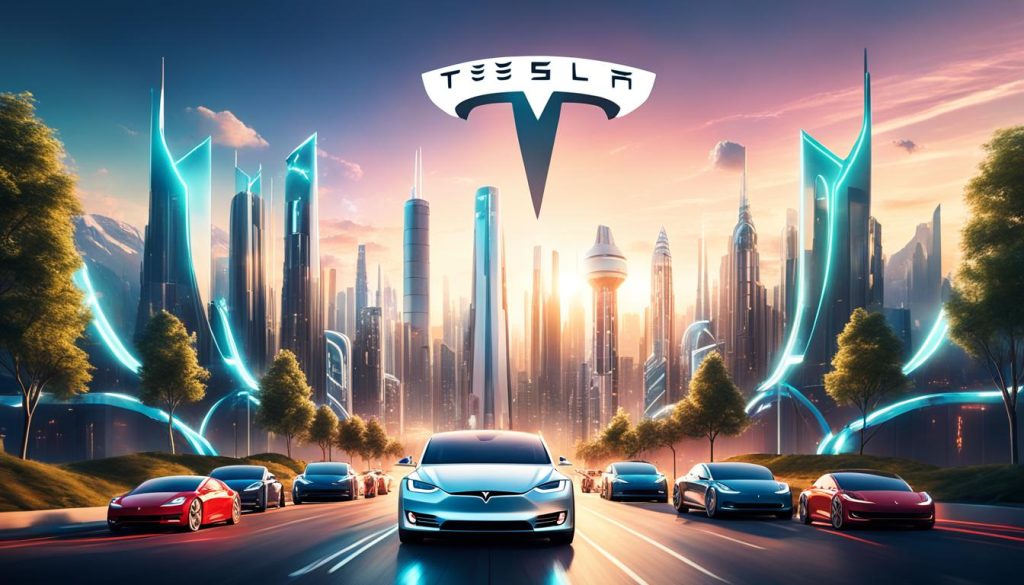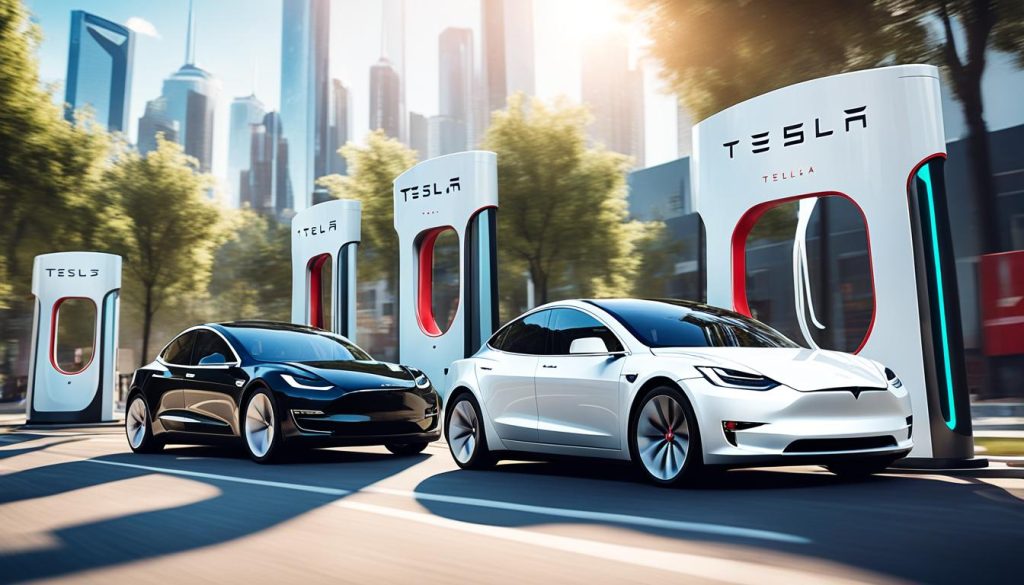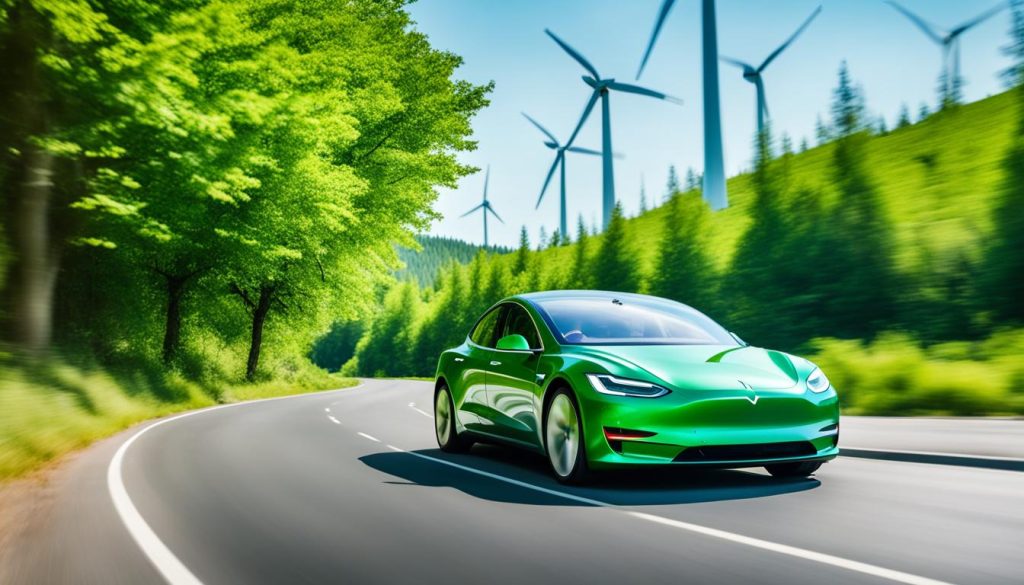Are you ready to be a part of the electric vehicle (EV) revolution? Look no further than Tesla, the pioneering force shaping the future of sustainable transportation. Led by the visionary Elon Musk, Tesla has disrupted the traditional automotive landscape, offering cutting-edge solutions that are redefining the way we think about mobility and energy.

As a publicly traded company on the NASDAQ exchange (TSLA), Tesla has established a strong presence in the stock market, attracting investors eager to capitalize on the growing demand for electric vehicles and sustainable energy solutions. From innovative lithium-ion battery technology to ambitious plans for more affordable EV models and self-driving cars, Tesla is poised to shape the future of transportation and energy.
But what sets Tesla apart, and why should you consider investing in this electrifying company? Dive into our comprehensive exploration of the Tesla stock, and uncover the insights that can help you make informed decisions about the future of the automotive industry and your investment portfolio.
Key Takeaways
- Tesla is a pioneer in the electric vehicle industry, disrupting the traditional automotive landscape.
- Elon Musk’s visionary leadership has been a driving force behind Tesla’s success.
- Tesla’s focus on sustainable energy solutions, including lithium-ion battery technology, sets it apart.
- As a publicly traded company on the NASDAQ, Tesla offers investors a chance to be part of the EV revolution.
- Tesla’s ambitious plans for affordable EVs, autonomous driving, and energy storage solutions position it to shape the future of transportation.
tesla stock: A Pioneering Force in Electric Vehicles
Elon Musk’s visionary leadership has been a driving force behind Tesla’s success in the EV market. As the company’s CEO, Musk has guided Tesla in developing innovative sustainable energy solutions, including solar energy generation and storage, as well as pioneering lithium-ion battery technology that powers its electric vehicles. Tesla’s unwavering focus on sustainable energy and advanced battery systems has positioned the company as a trailblazer in the transition towards a more environmentally-friendly transportation future.
Elon Musk’s Visionary Leadership
Musk’s innovative mindset and commitment to sustainability have been instrumental in shaping Tesla’s trajectory. Under his leadership, the company has not only pushed the boundaries of electric vehicle technology but has also made significant strides in renewable energy solutions, solidifying Tesla’s position as a elon musk in the industry.
Sustainable Energy Solutions
Tesla’s dedication to sustainable energy has been a cornerstone of its mission. The company’s offerings, including solar energy generation and storage systems, complement its electric vehicle lineup, providing a comprehensive approach to reducing carbon emissions and promoting a more sustainable future.
Lithium-Ion Battery Technology
At the heart of Tesla’s electric vehicles is its innovative lithium-ion battery technology. The company’s advancements in battery systems have not only improved the performance and range of its electric vehicles but have also contributed to the broader adoption of EVs by making them more accessible and practical for consumers.
Tesla’s Financial Performance and Stock Market Presence
As a publicly-traded company on the NASDAQ exchange, Tesla’s financial performance and stock market presence are closely monitored by investors. The company has reported revenue and profitability trends that have impacted the performance of its TSLA stock. Despite some recent challenges, Tesla’s stock has maintained a strong presence in the market, reflecting investor interest in the company’s future potential in the electric vehicle and sustainable energy sectors.
Revenue and Profitability Trends
Tesla has consistently reported impressive revenue growth, driven by the increasing demand for its electric vehicles. The company’s profitability, however, has been a topic of discussion, with Tesla navigating through various operational and supply chain challenges. Nonetheless, Tesla’s ability to maintain a strong financial footing and continue to expand its market share has been a key factor in attracting investor attention to the TSLA stock.
NASDAQ: TSLA Stock Performance
Tesla’s stock, trading on the NASDAQ exchange under the ticker symbol TSLA, has been a subject of keen interest among investors. The stock has experienced significant volatility, reflecting the market’s response to the company’s strategic decisions, production milestones, and broader economic conditions. Despite these fluctuations, Tesla’s TSLA stock has remained a prominent player in the stock market, as investors continue to recognize the company’s long-term potential in the electric vehicle and sustainable energy sectors.
Automotive Industry Disruption and Competition
The automotive industry has undergone a significant shift with the rise of electric vehicles (EVs) and the entry of innovative companies like Tesla. This disruptive force has challenged the traditional automakers to adapt and evolve their strategies to keep pace with the changing market dynamics.
Challenging Traditional Automakers
Tesla’s success in the EV market has compelled established automakers, such as Ford, General Motors, and Volkswagen, to invest heavily in their own electric vehicle programs. These traditional players are now scrambling to catch up with Tesla’s technological advancements and consumer-centric approach, as they seek to maintain their market share in the automotive industry.
Emerging EV Rivals
Alongside the traditional automakers, a new wave of EV rivals has emerged, challenging Tesla’s dominance in the electric vehicles space. Companies like Lucid, Rivian, and Nio have introduced their own innovative EV models, offering consumers more choices and compelling features. These emerging EV rivals are aggressively pursuing market share and developing cutting-edge technologies to compete with Tesla’s offerings.
As the automotive industry continues to evolve, the competition between Tesla and its traditional automakers and EV rivals is expected to intensify, driving further innovation and advancements in the electric vehicles market.
Tesla’s Future Plans and Strategies
As a pioneering force in the electric vehicle (EV) industry, Tesla is actively developing plans and strategies to shape the future of sustainable transportation. This multifaceted approach includes the introduction of more affordable EV models, the advancement of autonomous driving technology, and the expansion of their energy storage solutions.
More Affordable EV Models
To further expand their market reach, Tesla is committed to introducing more affordable EV models that cater to a wider range of consumers. By making electric vehicles more accessible, the company aims to accelerate the adoption of sustainable transportation and reduce carbon emissions across the globe. These affordable Tesla models will leverage the company’s expertise in battery technology and innovative design to provide a compelling alternative to traditional gasoline-powered vehicles.
Autonomous Driving Technology
At the forefront of the self-driving revolution, Tesla is dedicated to advancing its autonomous driving capabilities. With the ongoing development of its Autopilot and Full Self-Driving technologies, the company is working to revolutionize the future of mobility. By integrating these cutting-edge autonomous systems into their vehicles, Tesla is poised to redefine the way we think about transportation and the daily commute.
Expanding Energy Storage Solutions
Beyond its focus on electric vehicles, Tesla is also expanding its energy storage solutions to support the growing demand for sustainable energy. Through its Powerwall and Powerpack products, the company is providing homeowners, businesses, and grid operators with innovative energy storage systems that complement its electric vehicles and renewable energy initiatives. This multifaceted approach to energy solutions demonstrates Tesla’s commitment to shaping a more sustainable future.

These strategic initiatives underscore Tesla’s dedication to driving innovation and meeting the evolving needs of consumers in the electric vehicle and energy sectors. By introducing more affordable EV models, advancing autonomous driving technology, and expanding its energy storage solutions, Tesla is positioning itself as a key player in the transformation of the global transportation and energy landscapes.
Investing in Tesla: Opportunities and Risks
Investing in Tesla stock presents a unique combination of opportunities and risks for investors. On the one hand, Tesla’s position as a pioneer in the electric vehicle (EV) market, its innovative technologies, and its ambitious growth plans make it an attractive investment option for those seeking exposure to the future of sustainable energy and electric mobility. The company’s focus on developing more affordable EV models, advancing autonomous driving capabilities, and expanding its energy storage solutions have the potential to drive significant long-term value for shareholders.
However, Tesla also faces a range of challenges that can introduce risks for investors. Increasing competition from both established automakers and emerging EV startups, ongoing supply chain issues, and potential regulatory changes are some of the factors that could impact the company’s financial performance and stock price. Careful analysis of Tesla’s financial standing, market position, and strategic initiatives is crucial for making informed investment decisions.
| Opportunities | Risks |
|---|---|
|
|
Ultimately, investing in Tesla stock requires a careful evaluation of the company’s strengths, challenges, and long-term potential. By staying informed about the latest developments in the EV market and Tesla’s strategic initiatives, investors can make more informed decisions and navigate the opportunities and risks associated with this pioneering electric vehicle manufacturer.
Tesla’s Impact on Sustainable Transportation
Tesla’s focus on electric vehicles and sustainable energy solutions has had a profound impact on the transportation industry’s shift towards more environmentally-friendly options. By manufacturing electric cars that produce zero direct emissions, Tesla has contributed significantly to the reduction of carbon emissions and the promotion of EV adoption worldwide. The company’s innovative technologies and unwavering commitment to sustainability have played a crucial role in driving the transition towards a more sustainable transportation future.
Reducing Carbon Emissions
As the transportation sector accounts for a significant portion of global carbon emissions, Tesla’s electric vehicles have emerged as a powerful solution in the fight against climate change. By offering a viable alternative to traditional gasoline-powered cars, Tesla has enabled drivers to significantly reduce their carbon footprint and contribute to a cleaner, more sustainable environment. The company’s relentless pursuit of advancements in battery technology and energy efficiency has made electric vehicles more accessible and appealing to a wider consumer base, further accelerating the shift towards sustainable transportation.
Promoting EV Adoption
Tesla’s leadership in the electric vehicle market has played a pivotal role in promoting the widespread adoption of EVs worldwide. The company’s sleek and technologically-advanced models, coupled with its commitment to expanding the charging infrastructure, have made electric vehicles a more practical and desirable choice for consumers. As more individuals and governments recognize the benefits of sustainable transportation, the demand for Tesla’s electric cars and the overall EV market has surged, paving the way for a future where electric mobility becomes the norm rather than the exception.

The Role of Government Policies and Incentives
The electric vehicle industry, including Tesla’s operations, has greatly benefited from the support of government policies and incentives. Tax credits and subsidies provided by various governments around the world have played a crucial role in making electric vehicles more accessible and affordable for consumers. These financial incentives have helped bridge the gap between the higher upfront costs of EVs and their long-term environmental and operational benefits.
Tax Credits and Subsidies
Governments have implemented a range of tax credits and subsidies to encourage the adoption of electric vehicles. In the United States, for example, the federal government offers a tax credit of up to $7,500 for the purchase of a new EV. Many state governments also provide additional incentives, such as rebates, tax exemptions, and discounted electricity rates for EV owners. These government-backed financial incentives have been instrumental in making electric vehicles a more attractive option for a wider range of consumers.
Infrastructure Development
Alongside financial incentives, the development of charging infrastructure has been a key focus for governments aiming to support the growth of the electric vehicle industry. The installation of public charging stations, often with the help of government funding and partnerships, has been essential in addressing range anxiety and facilitating the widespread adoption of EVs. These infrastructure investments have created a more accessible and convenient environment for electric vehicle owners, further driving the transition towards sustainable transportation.
The combination of government policies, tax credits, subsidies, and infrastructure development has played a pivotal role in shaping the electric vehicle market, including Tesla’s success. By creating a favorable environment for EV adoption, these initiatives have helped pave the way for companies like Tesla to thrive and contribute to the shift towards a more sustainable future.
Tesla’s Brand and Marketing Strategies
Tesla’s brand and marketing strategies have been instrumental in shaping its success in the electric vehicle market. The company’s innovative product design, featuring sleek and technologically-advanced models, has captured the attention of consumers and positioned Tesla as a premium brand in the EV space.
In addition to its captivating product design, Tesla has also leveraged its strong social media presence to effectively communicate its vision and connect with its customer base. With a large and engaged following across various platforms, the company has been able to further strengthen its brand image and reputation, solidifying its position as a leader in the tesla brand and marketing strategies for the electric vehicle industry.
Innovative Product Design
Tesla’s commitment to innovative product design has been a key driver of its success. The company’s sleek and technologically-advanced vehicle models, such as the Model S, Model 3, and Model Y, have captivated the attention of consumers, positioning Tesla as a premium brand in the electric vehicle market. By continuously pushing the boundaries of design and incorporating the latest advancements in automotive technology, Tesla has established a distinct brand identity that resonates with its target audience.
Social Media Presence
Tesla’s strong social media presence has been a crucial component of its marketing strategy. The company has built a large and engaged following on platforms like Twitter, Instagram, and Facebook, allowing it to effectively communicate its vision, showcase its products, and connect with its customer base. Through engaging content, product updates, and direct interaction with its followers, Tesla has been able to strengthen its brand image and reputation, further solidifying its position as a leader in the electric vehicle industry.
Self-Driving Cars and the Future of Mobility
Tesla is at the forefront of the development of autonomous driving technology, with its Autopilot and Full Self-Driving capabilities. The company’s ambition to bring self-driving cars to the mainstream, including its plans for robotaxi and Cybercab concepts, has the potential to revolutionize the future of mobility. As Tesla continues to invest in and refine its autonomous driving systems, it aims to shape the way we think about transportation and the way we move from one place to another.
Tesla’s Autopilot and Full Self-Driving Capabilities
Tesla’s Autopilot and Full Self-Driving technologies are at the heart of the company’s vision for the future of transportation. These advanced driver-assistance systems utilize a suite of sensors, cameras, and powerful computing power to enable self-driving cars to navigate roads and highways safely and efficiently. As Tesla continues to refine and enhance these capabilities, the company is inching closer towards its goal of delivering a fully autonomous driving experience to its customers.
Robotaxi and Cybercab Concepts
Looking beyond individual consumer vehicles, Tesla has also introduced ambitious concepts for robotaxi and Cybercab services. These autonomous ride-hailing platforms have the potential to transform the way people move around urban and suburban areas, offering a convenient and eco-friendly transportation alternative to traditional taxis and ride-sharing services. By leveraging its self-driving technology, Tesla aims to pave the way for a future where self-driving cars become the norm, revolutionizing the future of mobility.
Conclusion
Tesla’s position as a pioneering force in the electric vehicle industry, its visionary leadership, and its focus on sustainable energy solutions have positioned the company as a key player in shaping the future of transportation and energy. From its innovative lithium-ion battery technology to its ambitious plans for more affordable EV models, autonomous driving capabilities, and expanding energy storage solutions, Tesla is at the forefront of the shift towards a more sustainable and technologically-advanced future.
As investors and consumers alike continue to recognize the potential of Tesla’s offerings, the company’s stock and its impact on the automotive industry and beyond are likely to remain a topic of growing interest and importance. Tesla’s unwavering commitment to innovation and its ability to disrupt traditional industries have solidified its position as a leading force in the transition towards a more sustainable and technologically-advanced future of mobility.
The future holds endless possibilities for Tesla as it continues to push the boundaries of what’s possible in the electric vehicle and sustainable energy sectors. With its visionary leadership, technological advancements, and dedication to shaping the future of mobility, Tesla is poised to be a driving force in the evolution of transportation and energy for years to come.

